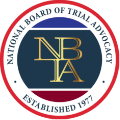Truckers have to comply with the rules of the road of every state in which they operate. In addition, the federal government, under the auspices of the Federal Motor Carrier Safety Administration (FMCSA), has its own rules for truckers at 49 C.F.R. Part 392.
FMCSA Regulations on Operation of Large Commercial Vehicles
According to FMCSA rules, drivers may not operate their vehicles when their attention is impaired by fatigue, illness or any other cause that makes operation of a vehicle unsafe. More detailed regulations regarding the number of hours that may be logged per day are found at 49 C.F.R. Part 395. The use of drugs or alcohol is prohibited. All speed limits must be observed. Vehicle operating and safety equipment must be inspected and in proper order. A vehicle’s cargo must be properly secured and inspected before the trip starts and again within the first 50 miles and every further 150 miles, every three hours or after every change of driver status, unless the vehicle is sealed or the cargo inaccessible.
Buses, cargo tank motor vehicles and cargo vehicles carrying listed hazardous substances must stop prior to railroad crossings and check for oncoming trains. These vehicles must not change gears while crossing the tracks. All other commercial motor vehicles must be driven at a speed that allows them to stop before reaching the tracks.
Commercial motor vehicles must be operated with extreme caution when adverse conditions, such as snow and ice, adversely affect visibility or traction. If these conditions become sufficiently dangerous, operation of the vehicle must be stopped. Drivers must wear seat belts.
Vehicles stopped for emergencies must use hazard signal flashers, reflective triangles and flares. Vehicle lamps and reflectors may not be obstructed by cargo or dirt. Drivers are prohibited from fueling vehicles with the motor running or with any source of ignition nearby. Commercial vehicles may carry no more than 119 gallons of reserve diesel fuel in a metal or plastic container. Drivers are also prohibited from picking up unauthorized passengers, using the vehicle when carbon monoxide is detected or using any open flame heater when the vehicle is in motion. Radar detectors are also prohibited.
FMCSA Regulation Violations Can Be Evidence of Negligence
Violation of any FMCSA regulations may result in citations from law enforcement. More importantly, violation of these federal regulations may be used as evidence of negligence in any civil lawsuit brought by persons injured or on behalf of those killed due to the negligent or reckless operation of a commercial motor vehicle. If you have been severely injured or a loved one was killed in a tractor-trailer accident [link to practice page], contact an experienced trucking accidents lawyer to discuss your options.
Practice Areas
- Personal Injury Overview
- Bicycle Accidents
- Birth Injuries
- Brain Injuries
- Burn Injuries
- Car Accidents
- Cerebral Palsy Birth Injuries
- Commercial Delivery Truck Collisions
- Construction Site Injuries
- Defective Product Injuries
- Dog Bite Injuries
- Drunk Driver (DUI) Accidents
- Gas Explosion Injuries
- Insurance Claim Disputes
- Medical Malpractice
- Mining Accident Injuries
- Motorcycle Accidents
- Pedestrian Accidents
- Rear-End Collisions
- Scaffold & Ladder Fall Injuries
- Shoulder Dystocia Birth Injuries
- Slip And Fall Accidents
- Spinal Cord Injuries
- Truck Accidents
- Uninsured Motorists
- Work Accidents
- Wrongful Death
- Wrongful Diagnosis













